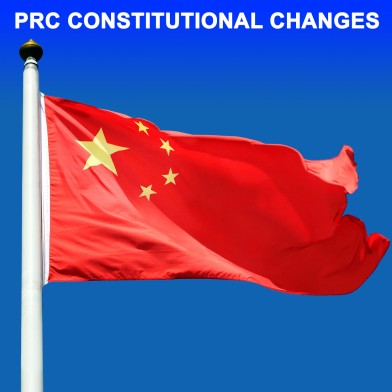Detective Superintendent Hamish McCardle has been the New Zealand Police Counsellor in Beijing for more than seven years. He has a Master’s degree in Chinese law from Beijing’s China University of Political Science and Law. On a visit to Wellington in February, he spoke to public sector employees about New Zealand’s interactions with the Chinese legal system. The following is based on his presentation.
Law enforcement cooperation between New Zealand and China
Law enforcement cooperation with China is in good shape with healthy exchange across an array of cases.
The Ministry of Public Security are the primary agency for law enforcement in China. They are quite an interesting agency: a national police with the functions of a ministry, immigration service, fire service, border security, and coastguard.
The Ministry of Justice for China is also a regular contact, especially as the central authority for transmission of formal requests. Then the Supreme People’s Procuratorate, the prosecutor arm of the state. It is also an investigation agency for crimes of corruption committed by public servants, but the work scope will change soon as the anti-corruption function will pass to the Ministry of Supervision, co-badged with the Communist Party’s Central Commission for Discipline Inspection.
Finally, we have a regular relationship with the People’s Bank of China, which houses China’s Financial Intelligence Unit for financial crime enquiries and information exchange.
With those five key agencies, you can probably guess the role of the New Zealand Police counsellor is sometimes quite busy. We draw cases from China and New Zealand that need to be channelled through those different agencies for investigation.
With the current push on anti-corruption, when you can get multiple agencies dealing with corruption cases, each one of those agencies can press quite sturdily with us the importance of their case and seek priority.
Don’t worry, using a balance of trade arrangement we push back quite positively on cases we’re interested in, including preventing drugs, precursor chemicals or other unregulated substances that might be shipped out of China to our country. To get those cases prioritised in China is no easy feat. China’s a big country, and you can imagine that 10kg of methamphetamine, which has a street value in New Zealand of $10 million, isn’t such a big deal there. Capturing the appropriate attention around cases that are important to prevent harm in our communities requires us to have a balanced approach in our work. It’s not all one-way traffic.

"Capturing the appropriate attention around cases that are important to prevent harm in our communities requires us to have a balanced approach in our work." (Photo: New Zealand Police/Facebook)
Modes of cooperation
New Zealand and China have several official channels to cooperate through, starting from the top with a 2006 treaty on criminal cooperation, our own domestic law on mutual assistance requests, and of course our extradition law. Interpol also provides support at the day-to-day tactical level and as a way to exchange information.
The main workhorse of our day-to-day operations is done under our memorandum of arrangements. The main one is the crime cooperation arrangement signed in 2010. This has provided a practical way for our two countries to look at cases that are under active investigation and get answers from each other where we’re satisfied we can control the end use of information and the outcome. The memorandum of arrangements provide a practical level of trust between enforcement agencies. About 70-80 percent of our work gets done under memorandum processes. For example, we have one with the People’s Bank of China which allows us to share suspicious transaction reports between the two countries.
Another example is the memorandum for precursor chemicals control. Precursor chemicals aren’t criminalised directly in China so we need a separate one to allow us to do that type of work. This is a big issue for New Zealand because our kids are taking substances that we simply don’t know the chemical composition of, and are winding up dead or frothing at the mouth at emergency departments. Attending medical staff simply have no idea what substances they are treating.
The threat of methamphetamine
Until fairly recently China didn’t have an officially recognised methamphetamine abuse problem. Their main drugs of abuse previously had been drugs that come out of the ground – such as opium, heroin.
Three years ago, the number of registered meth users overtook opioid users for the first time. Both the President and Premier of China made an anti-drug statement; this was unprecedented and underscored how serious China is in wanting to tackle this internal health threat.
The trouble for New Zealand is that as soon as China starts making methamphetamine for a growing internal market, the price goes down and production volume goes up. We have already started to see a change to finished methamphetamine, rather than precursor chemicals, being our number one drug import from China.
This is not just a China story unfortunately. Major methamphetamine labs are in other parts of Asia as well. Northern Myanmar’s Shan State is traditionally a home for heroin production, and is also increasingly involved in making a lot of meth.
Add onto these drugs threats are new psychoactive substances--so-called party drugs or synthetic cannabis packets. A lot of the source chemicals are made in China, though not exclusively China.
What President Xi means by a ‘rule of law with Chinese characteristics’
I think we can see where China wants to head to on rule of law, and whether that satisfies everyone in the West as a ‘model’ rule of law isn’t China’s concern. In this context a rule of law with Chinese characteristics is likely an apt term for what will be a unique result that draws on China’s historical legal developments.
A rule of law with Chinese characteristics is one we might think of as a ‘thickish’ rule of law. Not richly thick like ours, but certainly not thin. What I believe China is heading for is a rule of law with sufficient credibility to support China’s internal needs. There’s quite a lot happening in the wider legal framework inside China to support change – such as requiring judges to have law degrees and training more lawyers.
In the industrial and international property protection courts in Beijing, Shanghai, and Shenzhen, you will find excellent judges. They have to be excellent – they are sitting on cases worth millions of dollars in trade protection matters. But in the far western provinces, the far away parts of north-eastern China, in local courts you may still find retired colonels from the army who have no formal legal training. Such is the current state of the Chinese legal system and the challenge China faces in bringing 20,000 People’s Courts up to standard.

"I think we can see where China wants to head to on rule of law, and whether that satisfies everyone in the West as a ‘model’ rule of law isn’t China’s concern."
Cooperating with a country that has the death penalty
China is good to work with in terms of providing death penalty waivers on a case-by-case basis. Where I see the challenge for China on the death penalty is they don’t like foreign nations hectoring them about a sensitive domestic policy issue. They don’t like other countries saying: “The death penalty is bad, you’re bad.”
However, case by case this sensitive issue can be managed. For example, the Herin Mohini murder from Auckland some years ago where Chinese student Xiao Zhen stabbed the taxi driver to death and ran away back to China. Under a mutual assistance request we transferred the New Zealand criminal prosecution to the Chinese courts with a waiver in place from the Supreme People’s Court. He was tried in Shanghai and convicted to 15 years’ imprisonment.
The death penalty remains an important legal issue for us to advocate on with China. But in this way, it need not become a barrier to cooperation on a case-by-case basis.
Views expressed are personal to the author.
– Asia Media Centre


